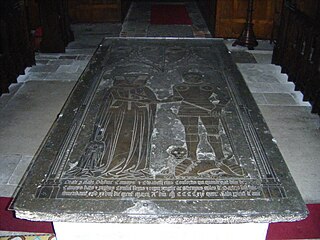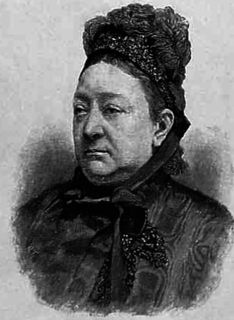Related Research Articles

Earl of Coventry is a title that has been created twice in the Peerage of England. The first creation for the Villiers family was created in 1623 and took its name from the city of Coventry. It became extinct in 1687. A decade later, the second creation was for the Coventry family and is still extant.

Catherine Grace Frances Gore, a prolific English novelist and dramatist, was the daughter of a wine merchant from Retford, Nottinghamshire. She became among the best known of the silver fork writers, who depicted gentility and etiquette in the high society of the Regency period.

Juliana Horatia Ewing was an English writer of children's stories. Her writings display a sympathetic insight into children's lives, an admiration for things military, and a strong religious faith.

Granville Leveson-Gower, 1st Earl Granville,, styled Lord Granville Leveson-Gower from 1786 to 1815 and The Viscount Granville from 1815 to 1833, was a British Whig statesman and diplomat from the Leveson-Gower family.

Henry Edward Fox, 4th Baron Holland of Holland, 4th Baron Holland of Foxley was briefly a British Whig politician and later an ambassador.

Elizabeth Bonhôte, née Mapes was an English novelist, essayist and poet. Her most successful work was Bungay Castle, a Gothic romance written after her husband had bought the ruins of the real Bungay Castle.
Mary Pilkington was an English novelist and poet. Many of her over forty novels were written for children.

Mary Alcock was an English poet, essayist, and philanthropist. She was part of Lady Anne Miller's literary circle in Bath.

Charles Hare Hemphill, 1st Baron Hemphill, PC QC, was an Irish politician and barrister.
Robert Barnabas Brough was an English writer. He wrote poetry, novels and plays and was a contributor to many periodicals.
Maria Abdy, née Smith, also known as Mrs Adby, was an English poet.

Dorothy Stafford, Lady Stafford was an English noblewoman, and an influential person at the court of Queen Elizabeth I of England, to whom she served as Mistress of the Robes. Dorothy Stafford was the second wife of Sir William Stafford, widower of Mary Boleyn. She and her family sought exile in Geneva during the reign of Mary I to escape the persecution of their Protestant religion. The Protestant reformer John Calvin stood as godfather to her youngest son.

Elizabeth Mortimer, Lady Percy and Baroness Camoys, was a medieval English noblewoman, the granddaughter of Lionel of Antwerp, 1st Duke of Clarence, and great-granddaughter of King Edward III. Her first husband was Sir Henry Percy, known to history as 'Hotspur'. She married secondly Thomas Camoys, 1st Baron Camoys. She is represented as 'Kate, Lady Percy,' in Shakespeare's Henry IV, Part 1, and briefly again as 'Widow Percy' in Henry IV, Part 2.

Lucy Madox Brown Rossetti was a British artist, author, and model associated with the Pre-Raphaelites. She was married to the writer and art critic William Michael Rossetti.

Janet Colquhoun was a British religious writer. She was a philanthropist who was involved with several good causes. She believed that the "fruits of faith will be evident in good work".
Theodora Elizabeth Lynch, born Foulks (1812–1885) was an English poet and novelist.
Charlotte Caroline Richardson was a minor British poet and writer. Her life was shaped in part by the publication The Ladies' Diary.

Margaret Mansfield, Baroness Sandhurst was a noted suffragist who was one of the first women elected to a city council in the United Kingdom. She was also a prominent spiritualist.
Agnes Mason was a British nun, notable as the founder of a religious order of the Anglican Communion, the Community of the Holy Family.

Ethel Margaret Arnold was an English journalist, author, and lecturer on female suffrage.
References
- 1 2 3 Brigitte Anton, ‘Hemphill, Barbara (d. 1858)’, Oxford Dictionary of National Biography, Oxford University Press, 2004 accessed 24 Jan 2015
- ↑ J. G. S. Macneill, ‘Hemphill, Charles Hare, first Baron Hemphill (1822–1908)’, rev. Terence A. M. Dooley, Oxford Dictionary of National Biography, Oxford University Press, 2004 accessed 24 Jan 2015
- ↑ Schmid, Susanne (2013). British literary salons of the late eighteenth and early nineteenth centuries. New York: Palgrave Macmillan. p. 228. ISBN 978-1137063748.